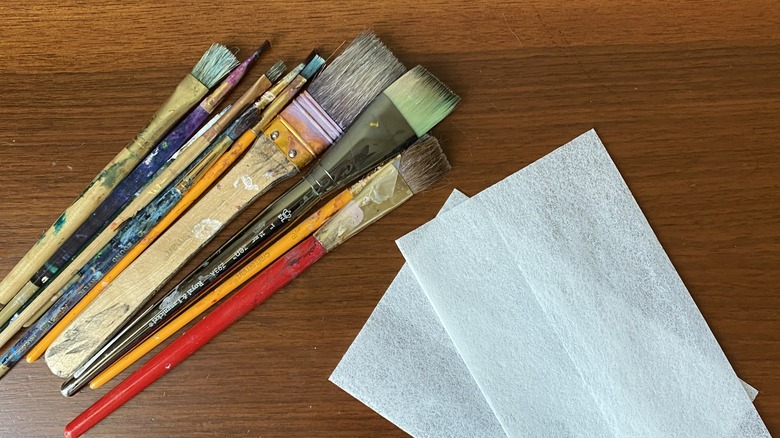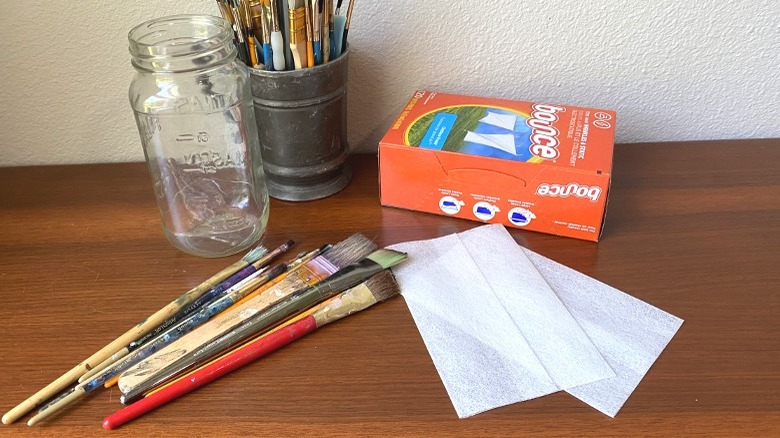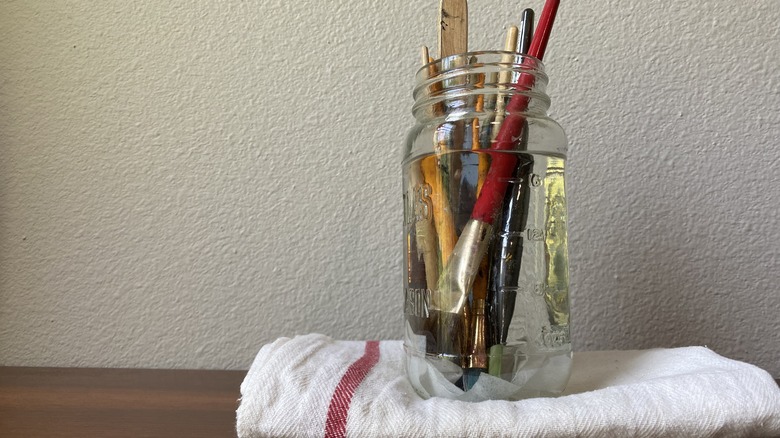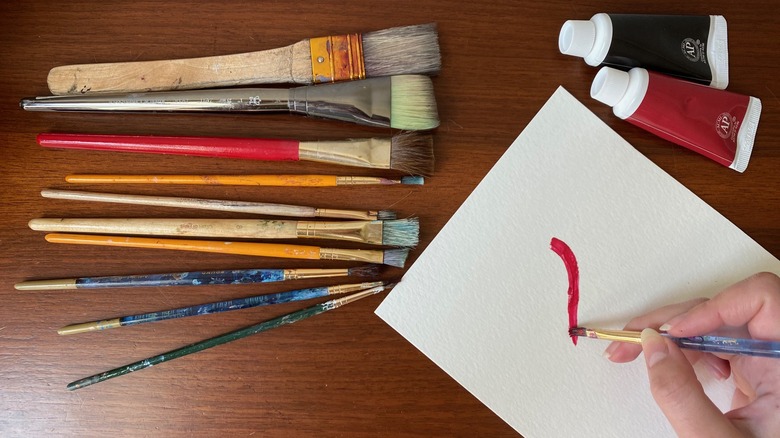We Tried The Dryer Sheets Hack To Clean Paint Brushes And We're Bristling With Satisfaction
We may receive a commission on purchases made from links.
When everything at the store seems to be becoming more expensive, finding multiple uses for your purchases is a worthwhile endeavor. Dryer sheets have a surprising number of uses outside the laundry room and can even be used to polish faucets, wipe down stovetops, and dust wood floors. Knowing they're great at removing gunk throughout the home, we wondered if they could also serve a purpose in the garage, where we complete art projects. Well, if you've got no shortage of mucked-up paintbrushes ready for retirement, you're in luck.
According to a popular internet hack, soaking your paintbrushes with a dryer sheet can help them shed some stuck-on paint and regain their pliability. The best part about the hack is that it's essentially free — assuming you have a box of dryer sheets lying around — which beats buying pricey paint thinners or replacing your brushes before every new project. Of course, before we could advise you to try anything, we had to test out the hack for ourselves. Could a dryer sheet really save all those crusty brushes in the back of our garage? Here's what we used to put the hack to the test, the simple steps we followed, and (of course!) the results.
Preparing our paintbrushes for a good bath
Gathering supplies to test this hack was incredibly easy since we already had everything we needed. The dryer sheets we used are from Bounce, but any standard dryer sheet could work for this hack. You can purchase a box of 250 Bounce dryer sheets at Target for $10.99 — roughly four cents per sheet. Next, we needed a container to soak the dryer sheets and paintbrushes; we opted for a 20 oz. Atlas canning jar left over from last night's pasta dinner. This was ideal so we could watch any changes take place through the glass, but you can use any heat-safe container.
Finally, we needed to gather some mucky paintbrushes to use as test subjects. This hack may be intended for brushes covered in interior latex paints, but we didn't have any old house-painting brushes on hand. Instead, we decided to conduct the test on some artists' paintbrushes that have become crusty and stained by acrylic paint over the years. We used a smartphone timer to ensure the experiment lasted precisely one hour. Still, you could use a kitchen timer, microwave, oven, a website like Tick Counter, or watch a few episodes of your favorite Netflix show and check up on the brushes once you get bored.
Time to soak!
First, we filled a kettle with plain tap water and began warming it on the stove. Next, we gently folded and stuffed one Bounce dryer sheet into the mason jar. If you're trying this hack with a larger container or dozens of dirty brushes, you may need to add more dryer sheets. When the kettle had barely started to simmer, we poured in the hot water and filled the jar to about the 16-ounce mark. We also folded a dish towel under the jar to protect the wood table from moisture or heat damage. Finally, we plunged the icky paintbrushes in head first. Some resources suggested soaking the brushes for half an hour, while others advised to leave them for a few hours. We decided to soak them for an hour and hoped for the best.
How could dryer sheets possibly dissolve stuck-on paint? Many standard dryer sheets contain acetone, a solvent commonly found in nail polish removers and paint thinners. Acetone is water-soluble, so when the dryer sheet is left in hot water, the acetone dissolves and starts working away at the crusted-on paint to restore paintbrushes. Immediately after plunging the paintbrushes into the Mason jar, we saw that bubbles started rising through the water. But could it really be working? Only time would tell.
We've taken a shine to this hack
After just one hour in the soaking jar, the water seemed noticeably cloudier, and some of the old paint was even beginning to peel away from the metal ferrules. We removed the paint brushes from the water jar and gave them a quick rinse under the kitchen faucet. With some picking and rubbing, the old paint fell away before our eyes. For the most part, the crusty paint was easy to remove, but some wood-handled brushes and extremely cakey bristles were still a bit tough. A few more hours of soaking for these guys probably would've done the trick.
After drying overnight, the bristles were noticeably cleaner, softer, and shinier. While the hack did help remove a good amount of gunk, it wasn't perfect; the older paintbrushes and those with coarse bristles held on to some discoloration, but we still think this hack is worth trying at home. Since acetone works well on acrylic paint, latex paint, adhesives, and lacquers, you can try using this hack for brushes covered in all sorts of gunk. Soaking the brushes overnight or scrubbing directly with a wet dryer sheet may even achieve better results. All in all, the hack costs less than ten cents for a dryer sheet, hot water, and a repurposed container, but it could potentially save you hundreds on replacing old paintbrushes.



